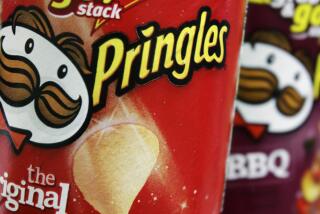Coke to Sell 51% of Its Bottling Unit to Public
- Share via
Coca-Cola Co., the world’s largest soft-drink maker, announced Monday that it plans to sell 51% of its newly established bottling company in a huge public stock offering that analysts say could raise nearly $2 billion.
A sale in the $2-billion range would be the biggest initial public stock offering in U.S. history, rivaled only by the proposed offering of shares in Consolidated Rail Corp., or Conrail. The proposed Conrail offering--if approved by Congress--is expected to total at least $1.7 billion.
Proceeds from the Coca-Cola stock sale will be used to reduce the debt accumulated in the purchases that led to the newly established bottling company--Coca-Cola Enterprises Inc.
The new company is taking over Coca-Cola bottling operations that its parent company previously owned plus two major independent bottlers that the Atlanta-based soft-drink company acquired this summer for about $2.4 billion: JTL Coca-Cola, its largest independent bottler, and Beatrice Cos.’ bottling franchises, including the one in Los Angeles.
One-Third of All Production
When the acquisitions are completed, the new company will produce and distribute more than one-third of the bottles and cans of Coca-Cola produced in the United States.
Coca-Cola officials would not comment on how much money the company seeks to raise through the public offering. Coca-Cola Chairman Roberto C. Goizueta said a registration statement for the public offering will be filed in early October. The sale is expected to be completed by the end of the year.
But Jesse Meyers, a leading soft-drink analyst who publishes the newsletter Beverage Digest, said Coke probably will seek close to $2 billion of its $2.4 billion in acquisition costs.
Analysts say that although some recent stock offerings have gotten a cool response on Wall Street, there should be widespread interest in Coca-Cola Enterprises’ shares.
“They’re not coming into a very good market,” said Emanuel Goldman, a beverage analyst at Montgomery Securities in San Francisco. “Nevertheless, since Coke is making the offering, it’s likely to get a good reception.”
Buying Up Franchises
Major soft-drink companies have bought and sold bottling franchises for years, although until recently they avoided major involvement in the field. Instead, the firms have opted to make their money by selling syrup or concentrate directly to fountain outlets such as McDonald’s and Burger King and to a network of mostly local entrepreneurs who mix the syrup into soda and distribute the bottles to stores for sale.
Recently, however, the major soft-drink companies have been buying up more and more franchises to exert more control over their franchise operations, which have grown more complex in recent years as both Coke and Pepsi have introduced a greater variety of soft-drink products to the market.
Rival Pepsico, for instance, recently paid $590 million to acquire Minneapolis-based MEI Corp., which bottles and delivers Pepsi-Cola in 15 states. Coca-Cola Enterprises will operate in 28 states and the District of Columbia. Overall, Coca-Cola’s bottling network has shrunk from a high of about 1,000 bottlers in the 1950s to about 275 groups that own between 325 and 350 bottling plants, said Art Gregory, executive director of the Coca-Cola Bottlers’ Assn. in Atlanta.
“It’s becoming a business of economies of scale, and franchises are changing hands from smaller operators to much larger ones,” said Martin Romm, a vice president at the First Boston Corp. investment house in New York. “It’s happening in much the same way as other franchise businesses. The feeling is bigger is better.”
More to Read
Inside the business of entertainment
The Wide Shot brings you news, analysis and insights on everything from streaming wars to production — and what it all means for the future.
You may occasionally receive promotional content from the Los Angeles Times.










